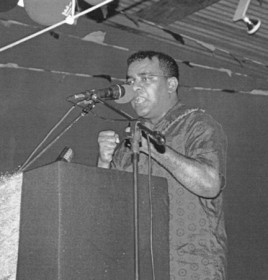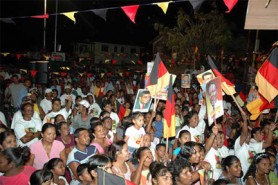Leon Trotsky − a founding member of the Communist Party of the Soviet Union who was expelled and murdered by the party’s general secretary Joseph Stalin − wrote perceptively and prophetically more than seventy years ago: “In inner-party politics, these methods lead, as we shall yet see, to this: the party organization substitutes itself for the party, the central committee substitutes itself for the organization and, finally, a ‘dictator’ substitutes himself for the central committee.”
Trotsky’s prescient analysis of the world’s first Leninist party in Russia could well be applied to the inner-party politics of one of the last − the People’s Progressive Party in Guyana today.
The direction of the party’s policies is determined not by canvassing the ordinary masses but by controlling the party apparatus where the really important decisions are made. Election of persons to fill the 35-member central committee is restricted to the delegates who qualify to attend the triennial congress.

As if by magic, the results always seem to reflect the desirable ethnic diversity, to represent a favourable geographical and generational spread and to reinforce the precept of ‘democratic centralism.’
Centralism
Election to the 15-member executive committee, however, is more centralistic than democratic. As exemplified in the experiences of Moses Nagamootoo, massive support by the ordinary delegates at congress does not necessarily translate into support for election to the executive committee. In his case, he secured 595 delegates’ votes at last year’s 39th Congress placing him fifth but he was not elected to the executive committee.
Although it is quite evident that collective decision-making is practised at the level of the executive committee, the weighty issues involved – personal survival, political power and national elections – are not playthings.
The central and executive committees control the party organisation in the triennium between congresses. In the absence of the overpowering influence of Cheddi and Janet Jagan for the first time in history, the real contest to determine who will assert his dominance has begun in earnest. Whoever controls the PPP executive committee expects to control the country.
Democratic centralism – the lifeblood of Leninism – is based on the undemocratic fiction of indirect election. Amazingly − as can still be seen in communist states such Cuba with the Castro brothers and Korea with Kim Il Sung’s son and grandson − this mechanism has the capacity to repeatedly return largely unchallenged and unchanging lists of leaders to the same positions, usually until they die.
In this way, the core membership of the PPP’s powerful executive committee can continue to remain in control for decades.

By avoiding messy direct elections where merit is measured, democratic centralism serves mainly to reward the compliant and chastise the refractory who challenge the status quo. By enforcing unity of action, it has been a useful instrument to contain ambitious aspirants and suppress conflict. The idea is that, once decisions are adopted by the majority, everyone must support the party line.
This precept was renewed soon after Janet Jagan’s cremation in March when President Bharrat Jagdeo declared that the party “will stay the course” that its co-founders − former Presidents Cheddi and Janet Jagan − charted.
The Party’s Executive Committee then appeared jointly at an unusual press conference in early April to attempt to reassure the public that it stood firm, faithful and united behind what it called Janet Jagan’s ‘legacy.’ But press conferences and funeral addresses were not enough to suppress the ambitions that the Jagan’s hands had held in check.
Factionalism
With a little over two years to go before the next general elections, the big question has emerged about who the party’s presidential candidate should be. Bharrat Jagdeo will be constitutionally ineligible to run for that position unless the constitution is changed either by the National Assembly or a National Referendum (plebiscite). It is possible, like former President Vladimir Putin of Russia who Jagdeo admires, that he would seek the office of Prime Minister and would continue to exert political power from that position. Retirement from the cabinet seems not to be an option.
Although Jagdeo exercises unequalled influence among his ‘peers,’ he does not yet wield absolute power in the central committee.
He needs the support of a majority faction to have his way and he started the process of faction building several years ago.
This was evident at the 39th Congress at Diamond last year when his supporter Reepu Daman Persaud ventilated the issue of Jagdeo’s ‘third term’ from the floor. No decision was taken but the point was made. Jagdeo then coyly responded to the entreaty by repeating that he had “no interest” in running for the presidency.
The party’s nomination of a candidate for the next election thereby became an issue. This encouraged other comrades on the central committee to follow one of three courses – to indicate their own interest, to throw their support behind a candidate of their choice or to attempt to obstruct others. As a result, two serious candidates for the party’s nomination – Donald Ramotar and Ralph Ramkarran – neither of whom has ever held a cabinet ministry, have emerged.
Ramotar, now 59 years old, is the ultimate apparatchik. He started off working at the party’s commercial arm – the Guiana Import-Export Company – as an adolescent; he also worked with the party’s labour arm – the Guyana Agricultural and General Workers Union.
He has been a member of the Central Committee for 33 years, of the Executive committee for 26 and the party’s General Secretary for 12 years.
He received 637 votes – the fourth highest score – for election to the Central Committee at the last Congress and was unanimously re-elected to the general secretaryship.
Ramkarran, at 63, is an attorney-at-law, a partner in a prosperous law firm and Speaker of the National Assembly.
He has been the nominee of the government and party on several commissions – Constitutional Reform, Elections and Border Security.
But, receiving only 374 votes and placing 22nd in the election to the Central Committee were unspectacular and unerring indicators of unpopularity. He has taken to writing regular articles in the Mirror and Chronicle newspapers to become better known but popularity has been elusive.
Frank Anthony and Robert Persaud have been mentioned as other possible contestants but their chances are low inside the party and lower in the country at large. Both are seen as Jagdeo’s placemen – pliant proxies who could be expected to show least resistance to Jagdeo, whatever position he chooses to occupy after 2011.
Nagamootoo, the fifth candidate, has proven that he has lots of friends among the ordinary party membership. But, as the quotation from Trotsky indicates, real party power resides not in the party membership but in the party organisation and the committees and there is where his enemies are.
Nagamootoo, furthermore, has become embroiled in cantankerous controversies with Jagdeo and, most recently, in an unseemly exchange of letters with Clement Rohee. He seems obsessed with trying to convince the world that he had been anointed by Cheddi Jagan to be appointed as presidential successor during an obscure meeting in Lethem in November 1996. Why Jagan would choose this distant site to make such an momentous announcement, rather than the central committee where decisions are made, remains a mystery.
Cultism
The personality cult – still a perennially popular practice in non-democracies such as Cuba and Korea – was employed to great effect to exalt Cheddi and Janet Jagan and to canonize and to protect them from challenge from the rank and file. A glance at the party’s election campaign in 2006 would show that the personality cult is still vibrant. Instead of the Jagans, however, the placards, posters and billboards now carry Jagdeo’s ubiquitous image. No challenger, even from within the party, can mobilise the resources and massive media support to compete with such a cult.
Beyond the imagery, Jagdeo strengthened his faction and enhanced his power by engineering the expulsion of the rebellious Khemraj Ramjattan in 2004. Nourished on a diet of centralism and ‘unity in action,’ the central committee rallied around Jagdeo but he was also assiduously building his faction in other ways. As president, he dispenses patronage on an unprecedented scale – multi-million dollar payouts to certain businessmen who were affected by the catastrophic fires in the Georgetown and New Amsterdam and as Christmas presents to the security forces; the appointment businesspersons as ambassadors and honorary consuls, the nomination of members to scores of agencies, boards and commissions and dispensing other favours.
Patronage has also become a useful instrument of social control to neutralise the hostility of union leaders, opposition politicians, and ethnic, religious and social critics. On the other hand, persons who give succour to the president’s adversaries could be denied similar benefits and nobody will be prepared to stand up for them. Over the past decade, the president has succeeded in packing the cabinet with persons who are personally loyal to him and in rejecting persons such as Nagamootoo who displayed unfriendly tendencies. With the sole exception of Prime Minister Samuel Hinds, Jagdeo had eliminated the ‘civic’ component from the cabinet.
The transition from the Jagan era to the Jagdeo era has already occurred. The future of political development in Guyana will be determined by the answers to two questions.
The first question is what is Jagdeo’s personal state of mind? There is no doubt that his power and patronage are at their zenith and, if he sets his mind to it, he could engineer the retention of that power in one way or another. In the present atmosphere, his comrades are more likely to support him than not, conscious of the fact that the wages of dissent could be the destruction of their political careers, as in the exemplary cases of Nagamootoo and Ramjattan.
The second question is what is the Central Committee’s collective state of mind? If the committee chooses the democratic alternative, it could prove Trotsky wrong by preventing the rise of a ‘dictator’ within its ranks. It can permit other aspirants to present their credentials to the general membership in an open manner. In doing so, it will allow the direct selection of the next presidential candidate based on merit.
If Trotsky was right, we know what to expect!




